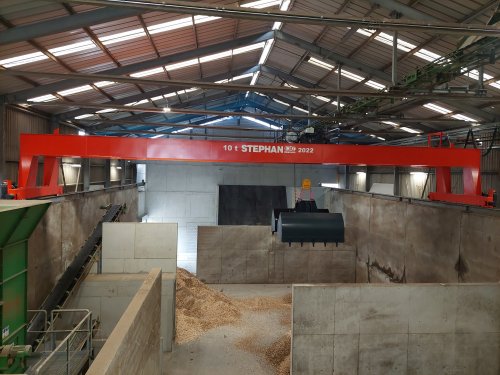Verlinde, Verlinde’s PDW winch, a robust, high-performance solution for biomass-fired power stations handling wood chips
Verlinde's PDW winch, a robust, high-performance solution for biomass-fired power stations handling wood chips
STEPHAN the Swiss specialist company in structural steelwork, facades, lifting equipment and mechanical welding turned to its 30-year supplier of lifting equipment, Verlinde, to supply a high-performance, robust winch. The PDW winch, an excellent model with a high class of use rating, met the requirements of the application as standard, without the need for costly engineering.

STEPHAN SA is a Fribourg-based company founded in 1902 and specializing in structural steelwork, facades, lifting equipment and mechanical welding. It employs almost 130 people at its 140 000 m2 site in Givisiez. STEPHAN's expertise is renowned resulting from over 120 years of experience at the service of its customers. The company is recognized on the market as a trusted partner, capable of taking on the most specialised projects, ranging from design to after-sales service, including the manufacturing, surface treatment, assembly and commissioning phases. STEPHAN sets itself the highest quality standards, which is why it continuously invests in its production facilities. It holds the most demanding certifications in various fields, and works in partnership with manufacturers renowned for the quality of their products. This is the case with VERLINDE, which has been supplying lifting equipment for nearly 30 years.
Biomass as an energy source: a market with a bright future
One of STEPHAN's customers sells wood chips, purchased wet from foresters, dried and then sold dry to biomass heating plants. The energy produced from this biomass is renewable and CO2-neutral. This type of energy production makes judicious use of organic waste or local raw materials such as wood. Biomass valorization as an energy source is a fast-growing sector in Switzerland.
Mr. Chevalley, STEPHAN's Industry Manager, explains: “In view of current environmental issues, energy production from biomass is one of the solutions of the future, and this type of heating system is expanding rapidly in Switzerland.
STEPHAN was consulted at the launch of this activity for the construction of the overhead travelling crane, designed to distribute the chips to various areas during the drying process. The overhead crane is automatic and managed by a PLC, which receives information sent by a set of sensors to various points on the production line.
The chips are delivered directly by the forestry workers into a first hopper. Probes are used to monitor the height of the piles. The crane moves the material from a certain fill level into storage areas determined according to chip quality. The chips are then transported to the dryer, depending on how full it is. Once dry, the crane moves them to a storage area, also filled according to demand. STEPHAN works with a partner for automation of the crane. The partner supplies the management software, and STEPHAN SA installs the sensors and control cabinets.
For this application, STEPHAN was in search of a winch to equip the overhead crane, capable of handling sustained output over long distances and at high speeds: the hall housing the production line measures 65m x 23m and is 16 meters high. The overhead travelling crane is a new installation, but installed in an existing building, a former tile factory, refitted for the new activity. There were certain layout constraints, such as the height of the overhead crane to optimize storage volume.
STEPHAN turned to VERLINDE, its long-standing partner for the supply of the winch and end carriage.
High capacity winches, even as a standard application
VERLINDE proposed a winch from the PDW range to meet the high performance and speed requirements of the application. The VERLINDE PDW family of open winches is dedicated to heavy-duty applications, from 6,300 to 70,000 kg. For the chip producer, the overhead travelling crane moves at speeds of 80 m/min (front to back), 50 m/min (right to left) and 30 m/min (lifting). It lifts loads of up to 10 tonnes, including grapple.
FEM M7 class of use is reached as standard, whereas some competitors' models required hours of development. This specificity saves engineering costs.
” The savings generated by integrating the PDW winch enabled us to provide a competitive response to our customer, while offering a product recognized for its quality and performance,” said Mr Chevalley. “STEPHAN had already designed and installed a dozen similar but smaller installations, so we hadn't used the same VERLINDE winch model. Here, the PDW winch meets all the specific criteria: a large transportable chip volume of 180 m3 per hour, high lifting capacity and speeds, meeting the requirements of the M7 mechanism group. This achievement provides us with a good reference and support for future equipment sales in this promising market” he concludes.
www.verlinde.com



